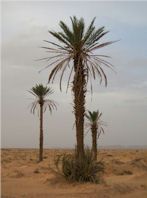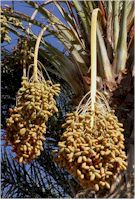 |
 |
Dates are the most wholesome and nourishing of all our imported fruits. Children especially appreciate their luscious sweetness, as afforded by an abundant sugar which is easily digested, and which quickly repairs waste of heat and fat. With such a view, likewise, doctors now advise dates for consumptive patients; also because they soothe an irritable chest, and promote expectoration; whilst, furthermore, they prevent costiveness. Dates are the fruit of the Date palm (Phoenix
dactylifera), or, Tree of Life.
In old English Bibles of the sixteenth century, the name Date-tree is constantly given to the Palm, and the fruit thereof was the first found by the Israelites when wandering in the Wilderness.
Oriental writers have attributed to this tree a certain semi-human consciousness. The name Phoenix was bestowed on the Date palm because a young shoot springs always from the withered stump of an old decayed Date tree, taking the place of the dead parent; and the specific term Dactylifera refers to a fancied resemblance between clusters of the fruit and the human fingers.
The Date palm is remarkably fond of water, and will not thrive unless growing near it, so that the Arabs say: "In order to flourish, its feet must be in the water, and its head in the fire (of a hot sun)." Travelers across the desert, when seeing palm Dates in the horizon, know that wells of water will be found near at hand: at the same time they sustain themselves with Date jam.
In some parts of the East this Date palm is thought been the tree of the forbidden fruit in the Garden of Eden. It is mystically represented as the tree of life in the sculptured foliage of early French churches, and on the primitive mosaics found in the apses of Roman Basilicas. Branches of this tree are carried about in Catholic countries on Palm Sunday. Formerly Dates were sent to England and elsewhere packed in mats from the Persian gulf; but now they arrive in clean
boxes, neatly laid, and free from duty; so that a wholesome, sustaining, and palatable meal may be had for one penny, if they are eaten with bread.
The Egyptian Dates are superior, being succulent and luscious when new, but apt to become somewhat hard after Christmas.
The Dates, however, which surpass all others in their general excellence, are grown with great care at Tafilat, two or three hundred miles inland from Morocco, a region to which Europeans seldom penetrate.
These Dates travel in small packages by camel, rail, and steamer, being of the best quality, and highly valued. Their exportation is prohibited by the African authorities at Tafilat, unless the fruit crop has been large enough to allow thereof after gathering the harvest with much religious ceremony.
Dates of a second quality are brought from Tunis, being intermixed with fragments of stalk and branch; whilst the inferior sorts come in the form of a cake, or paste (adjoue!), being pressed into baskets. In this shape they were tolerably common with us in Tudor times, and were then used for medicinal purposes. Strutt mentions a grocer's bill delivered in 1581, in which occurs the item of six pounds of dates supplied at a funeral for two shillings; and we read that in
1821 the best kind of dates cost five shillings a pound.
If taken as a portable refection by jurymen and others who may be kept from their customary food Dates will prevent exhaustion, and will serve to keep active the energies of mind and body. The fruit should be selected when large and soft, being moist, and of a reddish yellow color outside, and not much wrinkled, whilst having within a white membrane between the flesh and the stone.
Beads for rosaries are made in Barbary from Date stones turned in a lathe; or when soaked in water for a couple of days the stones may be given to cattle as a nutritious food, being first ground in a mill. The fodder being astringent will serve by its tannin, which is abundant, to cure or prevent looseness.
In a clever parody on Bret Harte's "Heathen Chinee," an undergraduate is detected in having primed himself before examination thus:
"Inscribed on his cuffs were the Furies, and Fates,
With a delicate map of the Dorian States:
Whilst they found in his palms, which were hollow,
What are common in Palms--namely, Dates."
Again, a conserve is prepared by the Egyptians from unripe Dates whole with sugar. The soft stones are edible: and this jam, though tasteless, is very nourishing. The Arabs say that Adam when driven out of Paradise took with him three things--the Date, chief of all fruits, Myrtle, and an ear of Wheat.
Another Palm the Sagus, or, Cycus revolute, which grows naturally in Japan and the East Indian Islands, being also cultivated in English hot-houses, yields by its gummy pith our highly nutritious sago. This when cooked is one of the best and most sustaining foods for children and infirm old persons. The Indians reserve their finest sago for the aged and afflicted. A fecula is washed from the abundant pith, which is chemically a starch, very demulcent, and more
digestible than that of rice. It never ferments in the stomach, and is very suitable for hectic persons. By the Arabs the pith of the Date-bearing Palm is eaten in like manner. The simple wholesome virtues of this domestic substance have been told of from childhood in the well-known nursery rhyme, which has been playfully rendered into Latin and French:
"There was an old man of Iago
Whom they kept upon nothing but sago;
Oh! how he did jump when the doctor said plump:
'To a roast leg of mutton you may go.'"
"Jamdudum senior quidam de rure Tobagus
Invito mad das carpserat ore dapes;
Sed medicus tandem non injucunda locutus:
'Assoe' dixit 'oves sunt tibi coena, senex.'"
"J'ai entendu parler d'un veillard de Tobag
Qui ne mangea longtemps que du ris et du sague;
Mais enfin le medecin lui dit ces mots:
'Allez vous en, mon ami, au gigot.'"
Herb Simples



